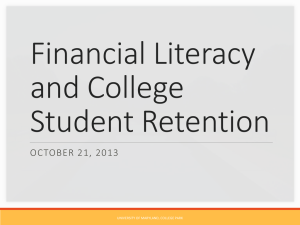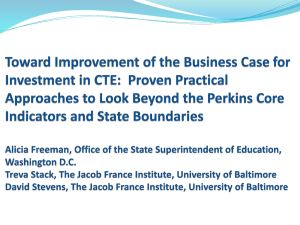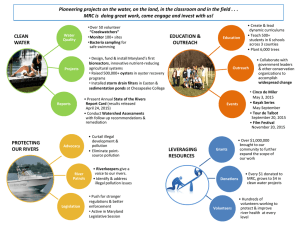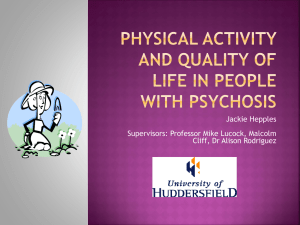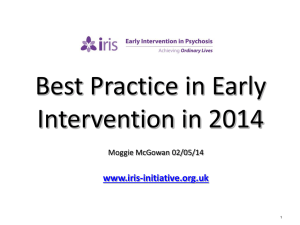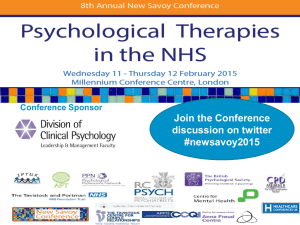States are required to use their 5 percent set
advertisement
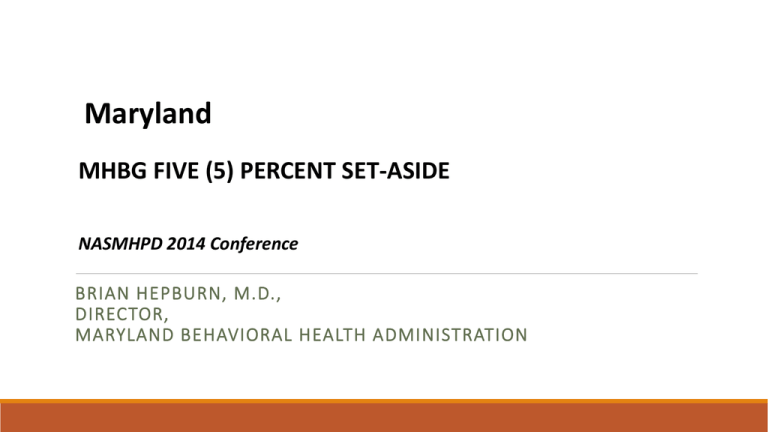
Maryland MHBG FIVE (5) PERCENT SET-ASIDE NASMHPD 2014 Conference BRIAN HEPBURN, M.D., DIRECTOR, MARYLAND BEHAVIORAL HEALTH ADMINISTRATION Congress increased FY2014 funds to the MHBG program by 5%, then required that the new funds be applied to early SMI interventions. The funding is dedicated to provide supports and services for those "with early serious mental illness" and not for primary prevention or preventive intervention for those at risk of serious mental illness. States are encouraged to fund programs to meet the needs of persons with early psychotic disorders, specifically first episode psychosis. States may address these needs either through enhancing existing program activities or development of new activities. Maryland’s NIMH RA1SE Project – Recovery After an Initial Schizophrenia Episode Maryland established an early psychosis intervention program in Baltimore in July, 2009 as a key element of the NIMH RA1SE research project. The RA1SE Connection Program is an intensive outpatient treatment team with weekly sessions of evidence-based services including medication management with a psychiatrist, psycho-education and skills training with licensed social workers, substance abuse treatment, and supported education and employment. The intermediate-term goal of the Connection Program is to provide communitybased recovery-oriented individualized services to persons who are within the first one to two years of developing psychosis and schizophrenia to improve functioning and reduce symptoms. The long-term goal is to prevent the development of long term disability and to promote independent, integrated community living. Five Percent (5%) Mental Health Block Grant Set-Aside for Early Intervention The Baltimore-based Connection program’s clinical services will be insufficient to meet the needs of young people with first episode psychosis (FEP) throughout the state. It is estimated that one team is needed for 500,000 population. Given Maryland’s population of approximately 6 million, this would suggest that approximately 12 teams are needed. Five Percent (5%) Mental Health Block Grant Set-Aside for Early Intervention RA1SE-type first-episode psychosis services are now called “Coordinated Specialty Care” (CSC) in federal guidance. The 5% mental health block grant set-aside will be used to further expand CSC through funding to support Maryland’s Early Intervention Program (EIP), a State-funded program currently under development in Maryland. The EIP will be comprised of three components: 1) Outreach and Education Services, 2) Clinical Services; and 3) Regional Early Intervention Learning Collaborative Teams. Research will be integrated into each of these components Five Percent (5%) Mental Health Block Grant Set-Aside for Early Intervention The 5% mental health block grant set-aside will primarily address the second component of the EIP, Clinical Services, implementing Coordinated Specialty Care (CSC). The funding will support infrastructure and management, as well as data collection/evaluation, of two new CSC Early Intervention Teams under the EIP, serving the same population as the RAISE Connection program described above. Although some of the services provided by the new teams will be reimbursable, a considerable number of them will not. Additionally, time spent in training, and more importantly, in outreach/education to the broader community are not reimbursable. Five Percent (5%) Mental Health Block Grant Set-Aside for Early Intervention The 5% mental health block grant funding will provide the critical support needed to structure the teams to maximally provide the appropriate support to those with early psychoses, as well as to provide outreach and education, in order to identify as many in need of these services as possible. The Coordinated Specialty Care Team roles include: Team Leader – overall coordination of services, individual therapy, case management, crisis intervention, information gathering, safety planning, outreach/education. Recovery Coach – Social Skills training, weekly participation group, monthly family group, school coordination, outreach/education. Employment/Education Specialist – Job development, addressing work and schoolrelated goals/problems, outreach/education. Psychiatrist – Prescribing, shared decision making, education. EIP Team Training a. psycho-education about psychosis b. assessment and diagnosis of early psychosis c. prescribing and management of recommended pharmacological treatments d. engaging young people and their families in care e. use and implementation of evidence-based practices for improving social functioning, reducing substance abuse, re-engaging in work or school or pursuing new educational/work opportunities, working with families, and assessment of and planning for safety. f. use of supported education and employment geared towards young adults g. safety planning h. providing care within a model of mental health recovery. EIP Team Training The Evidence Based Practice (EBP) Center of Behavioral Health Systems Improvement Collaborative, funded by the Maryland state authority at the University of Maryland Department of Psychiatry will provide training and consultation to the new teams. This will include use of evidence-based supported employment, co-occurring disorders, pharmacotherapy, and family psycho-education geared towards young adults. There will also be use and implementation of EBPs for improving social functioning and working with families. Evidence supported tools will also be utilized for assessment of aggression and violence, suicide risks, reducing substance use and re-engaging in school and pursuing new educational opportunities. EIP Data and Evaluation The Systems Evaluation Center within the Behavioral Health systems Improvement Collaborative at the University of Maryland will oversee the collection of data to ensure that Maryland meets the reporting requirements for this project. Additionally, as time and resources allow, the Center will perform additional evaluation activities in order to identify “lessons learned” during the Maryland implementation that can be applied to future system and program development. The Systems Evaluation Center and the Evidence-Based Practices Center will work together to develop and implement a fidelity assessment plan for the project. RA1SE Connection Team - Lessons Learned Have strong support by the Mental Health Authority and flexibility in funding. The insurance profile and needs may vary from site to site. Have trust and confidence in the relationship between the SMHA/University/Providers. (If new relationship, much attention needed to nurture relationship.) Try to use consumers insurance when possible. In Maryland’s experience approximately half had private insurance. The benefits package will be very different then the Medicaid package. (This becomes an issue when estimating financial needs.) Develop close relationship with Medicaid. To maximize enrolling individuals on MA and to learn from them regarding ways to establish alternative financing through waivers. RA1SE Connection Team - Lessons Learned, continued Need to have close relationship with program sites. The sites will have competing priorities. There need to be regular meetings and continued emphasis on the importance of the project. Get buy in from stakeholders groups. They can help with advising the project but also are good ambassadors for the program to legislators etc. Need a good evidence based practice training and implementation infrastructure – as provided through EBP Center at University of Maryland.


